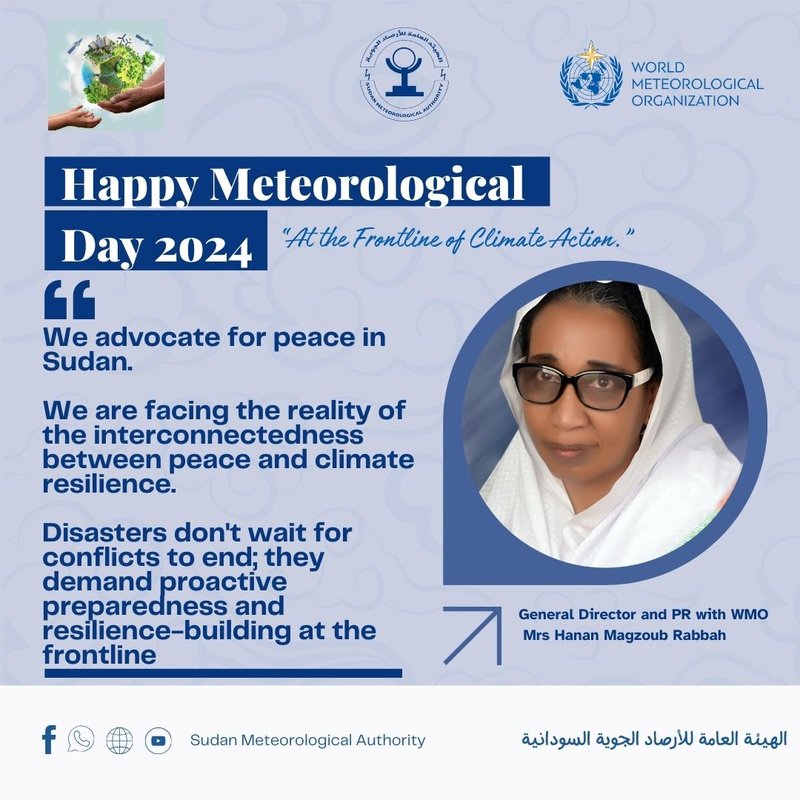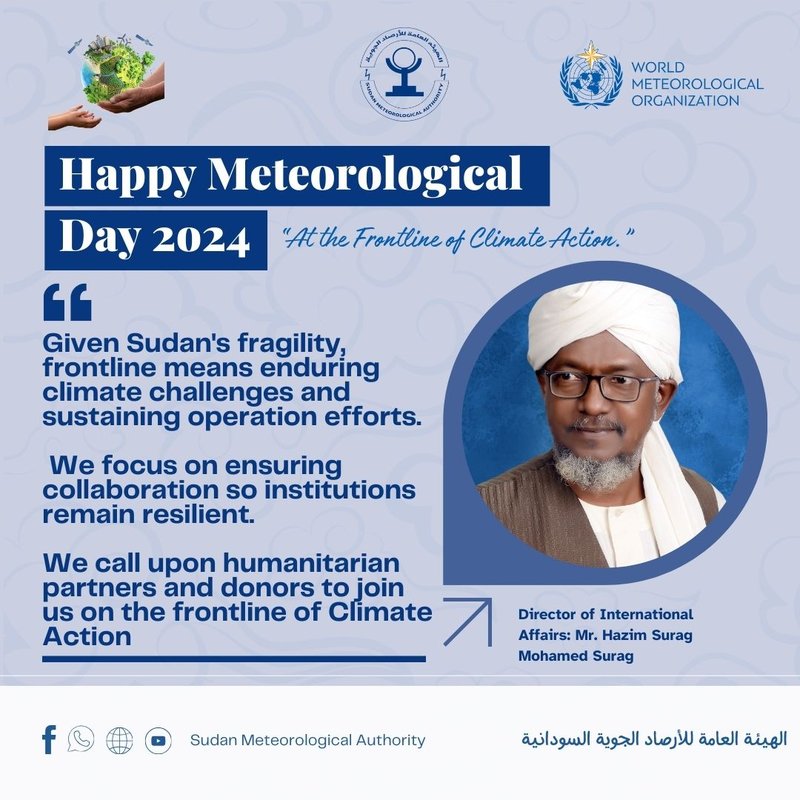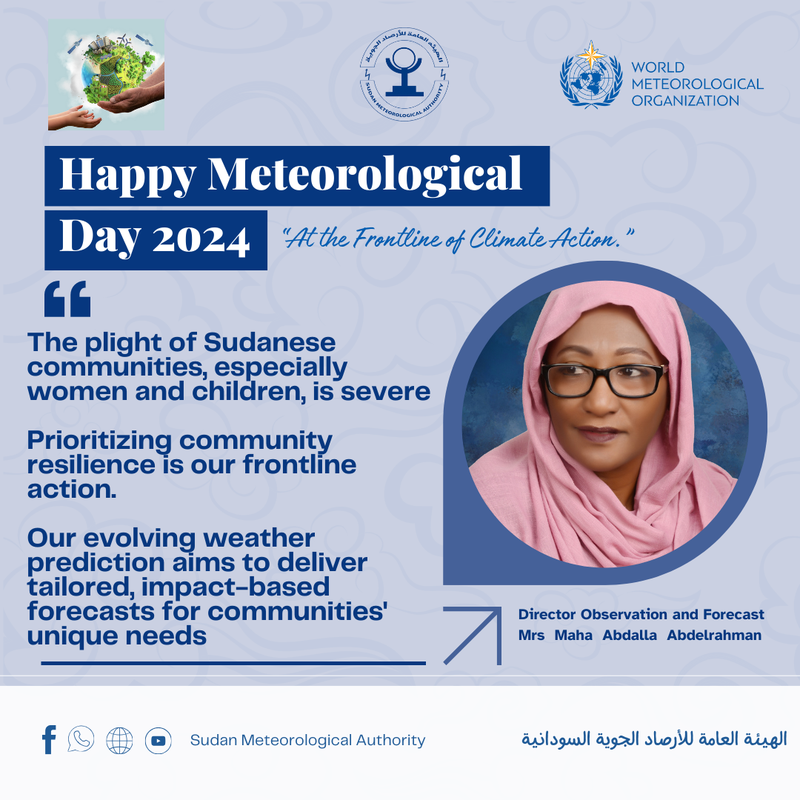Sudan Meteorological Authority, at the Frontline of Climate Action in a Fragile, Violent and Conflict (FVC ) Context
Background
Sudan, a country grappling with internal conflicts, faces a unique challenge in providing essential services like weather and climate information. Despite the political and economic turmoil, the Sudan Meteorological Authority (SMA) recognizes the critical role of accurate climate data. In fragile country contexts such as Sudan, characterized by violence, conflict, and instability, delivering reliable weather forecasts and climate information becomes even more crucial. This information empowers communities to prepare for and respond to climate shocks, like floods and droughts, that are becoming more frequent and severe due to climate change. For Sudan, robust climate services are paramount for building resilience and achieving overall climate action goals.

Progress amidst challenges
The main conflict that commenced in April 2023 significantly threatened the continuity of these crucial services, especially in the capital Khartoum where many supporting institutions are headquartered. Despite the conflict's challenges, SMA has demonstrated a remarkable commitment to sustaining climate services, highlighting their importance in fragile states.
SMA's Achievements
- Established an emergency office in Port Sudan to ensure critical operations continued: The essential operations were re-established primarily from Port Sudan, with additional support from Egypt and regional meteorological centers.
- Rescued observation data: Despite limitations, SMA continued to collect data manually from all safe, functional stations and recovered historical data from 29 stations, rebuilding critical climate information.
- Maintained communication: Utilized email, WhatsApp, and Facebook to disseminate weather and climate information.
- Continued engagement: Participated in key events like Climate Africa Week and COP28, showcasing their efforts at the "Early Warning for All in Fragile States" side event.
- Partnered with organizations like WMO and regional meteorological offices for ongoing support.

Vibrant participation at COP 28
Sudan's meteorological agency participated in a panel discussion on early warning systems in conflict-affected regions. Dr Hanan Rabbah, General Director, SMA, presented the agency’s efforts in maintaining climate services during conflict and emphasized the need for collaboration and funding. The World Meteorological Organization announced a new handbook and policy paper on early warning systems in fragile contexts.
Engagement during GHACOF66
SMA representatives attended the Greater Horn of Africa Climate Outlook Forum. They highlighted the importance of regional climate forecasts for Sudan, given their limitations in generating national forecasts. This participation underscores Sudan's reliance on and support for regional collaboration, especially during conflict.
Sudan's meteorological agency actively participates in international forums to improve early warning systems despite the challenges posed by the ongoing conflict. They emphasize the need for collaboration and highlight the value of regional cooperation.
Lessons learned
The Sudan Meteorological Authority (SMA) approach to maintaining essential climate services during a conflict situation provides key lessons for the IGAD region and globally. The lessons learned highlight strategies for ensuring service continuity, fostering resilience, and adapting to a fragile context.
Below are some of the key lessons ;
1. Strategic Response
Emergency Operations Centers
Establishing dedicated centers, like the one in Port Sudan, ensured critical services remained operational and secured funding for staff.
Climate Services Rescue Plan
A targeted plan, developed with partner support, guided recovery efforts, data rescue, and user outreach.
Project Re-scoping
Adapting existing projects to address emerging challenges and capitalize on new opportunities.
Strategic Partnerships
Collaborating with technical experts (WMO, ICPAC) and regional partners enhanced forecasting capacity and aligned efforts with broader initiatives. Effective communication and feedback mechanisms were established.
Impact-Based Forecasting
Adjusted products to provide actionable information relevant to the humanitarian context, focusing on community needs.
Digital Communication Tools
Utilizing platforms like WhatsApp and Facebook for communication and coordination among dispersed teams. A new Content Management System website was developed through WMO support.
Early Warning Systems for Vulnerable Communities
Collaboration with local stakeholders to develop targeted warning systems that are accessible and actionable for these communities.
These strategies demonstrate how meteorological agencies can adapt and maintain crucial services even in challenging environments, such as the one SMA operates within. The focus on collaboration, targeted communication, and user-centric information ensures climate services effectively address the needs of vulnerable communities.
2. Resource mobilization and sustainability
Staff Development and Retention
The most critical resource in an institution remains the staff. SMA prioritized training and capacity building for its staff to ensure continuity and enhance their ability to deliver climate services in challenging environments.
Securing Resources
Recognizing financial limitations, SMA actively sought funding through proposals and collaborations with development partners and humanitarian organizations.
Regional Collaboration
Strategic placement of staff at regional centers like ICPAC and Egypt Met provided access to forecasting resources and expertise, bolstering SMA's capabilities.

3. The future
Heightened Importance
The ongoing conflict and climate change magnify the importance of weather and climate services in Sudan, particularly for displaced populations.
Collaboration and Funding
Continued collaboration with regional and international partners is crucial for securing funding and strengthening Sudan's weather and climate service infrastructure.
Advocacy and Visibility
Raising awareness about the critical role of these services in fragile contexts is essential to garner sustained support.
Building Resilience
The focus should be on creating a robust and adaptable service framework that can withstand future challenges. Alignment with existing initiatives like "Early Warning for All" presents valuable opportunities.
Partnerships for Effective Response
for Effective Response Expanding partnerships with humanitarian actors on the ground is critical to ensure weather and climate information effectively contributes to emergency response and community resilience in the face of conflict and climate change.

